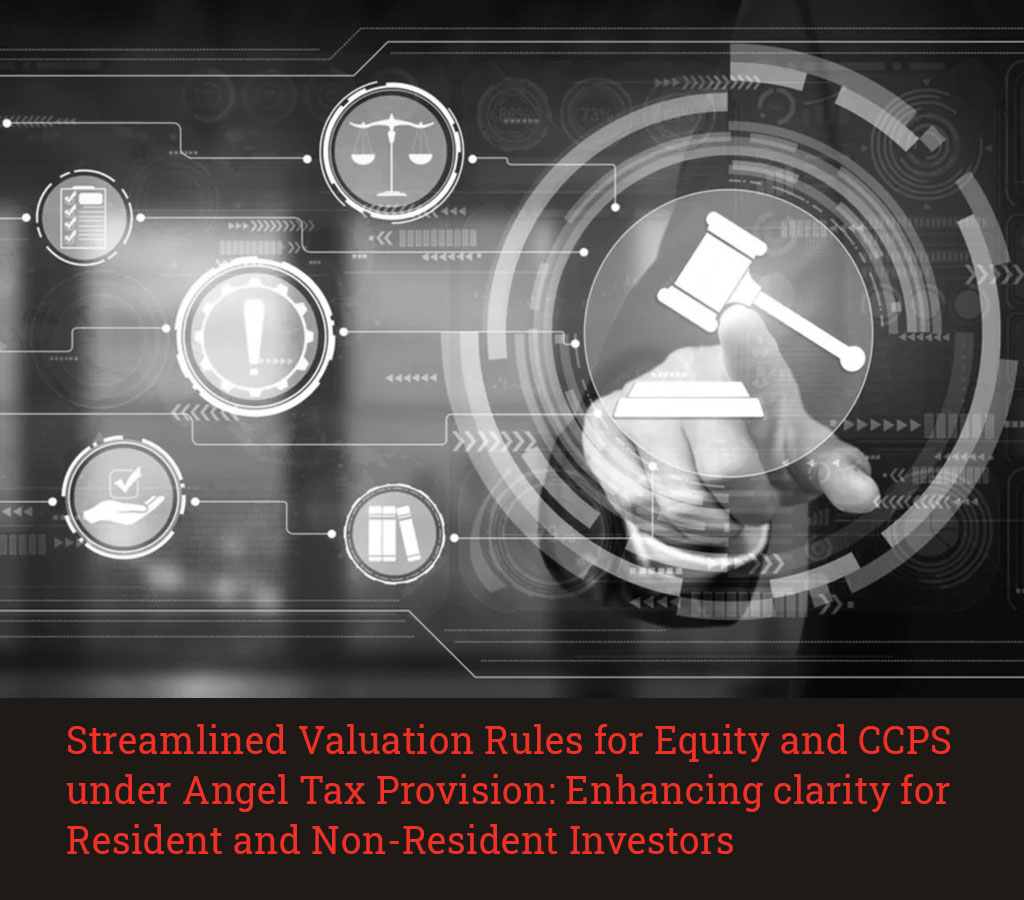AWFIS, 5th floor, Ambience Mall, Gate No. 03 & 04, Ambience Island, NH-84, Ambience Mall Gurgaon 122002
CBDT notifies new valuation rules for equity and CCPS for “angel tax” provision
The “angel tax” provision, formally recognized as Section 56(2)(viib) of the Income Tax Act, 1961, is meant to serve as an anti-abuse measure and comes into play when a closely held company (CHC) issues shares, including preference shares, at a premium surpassing the Fair Market Value (FMV) of those shares. Originally introduced in 2012, its purpose was to levy taxes on such premiums received from residents.
The Finance Act of 2023 brought changes to Section 56(2)(viib) by expanding its scope to encompass investments in shares made by non-residents (NRs). To this effect, the Central Board of Direct Taxes (CBDT) issued the draft valuation rules for the “angel tax” provision in May 2023.
However, these draft valuation rules primarily addressed the valuation of unquoted equity shares and lacked guidance on the valuation of
Compulsorily Convertible Preference Shares (CCPS).
Following the period of public consultation, the CBDT took steps to amend the valuation rules, with a focus on providing guidance for valuing CCPS, notably through the modification of Rule 11UA.
The final version of these amended rules became effective on September 25, 2023.
Key Features of Amended Rule 11UA
The CHC now has an option to select from any of the following valuation methods in relation to unquoted equity share or CCPS investment by residents and NRs:
| Name of valuation method | Applicable to which investor? | Unquoted Equity Shares | CCPS | Change as compared to erstwhile Rule 11UA |
|---|---|---|---|---|
| Net asset value | Both residents and non-residents | a | r | No change |
| DCF | Both residents and non-residents | a | a | Erstwhile Rule 11UA required valuation of CCPS as per Open Market Value |
| Comparable Company Multiple Method, PWERM, OPM, Milestone Analysis and Replacement Cost Methods | Only non-residents | a | a | New valuation method introduced for non-resident investors |
-
CCPS Valuation: The updated Rule 11UA, specifically provides a distinct valuation mechanism for CCPS. Additionally, it offers the option that FMV of CCPS can also be based on FMV of unquoted equity shares which is determined as per prescribed valuation methods.
Prior to the amendment, Rule 11UA required valuation of preference share at a price it would receive if sold in the open market on the valuation date (Open market value).
-
Price Matching Facility for both unquoted equity shares and CCPS: The amended outlines that the price at which companies issue unquoted equity shares or CCPS to ‘notified NR entities, venture capital funds (VCFs), or specified funds’ shall be adopted as the FMV for the purposes of benchmarking equity and CCPS investments by both resident and NR investors.
A company can avail the benefit of this price matching facility only if the price at which shares are issued to the ‘notified NR entities / VCF / specified funds’ falls within a window of 90 days before or after the date of share issuance that is subject to the valuation exercise.
-
Safe Harbor Limit: The amended Rule 11UA introduces a “safe harbor” limit of 10% for the valuation of equity shares and CCPS. This implies that if the issue price of unquoted shares or CCPS is within 10% of the price determined using the provided valuation methodologies, then that issue price will be considered as FMV.
This safe harbor limit applies to both resident and NR investments and provides a margin of safety when needed for things like foreign exchange fluctuations or compliance with the foreign exchange pricing guidelines.
-
Flexibility in valuation reports: The previous version of Rule 11UA required a merchant banker’s valuation report to be prepared as of the date of share issuance. The amended Rule 11UA introduces flexibility by allowing valuation reports issued up to 90 days prior to the date of issuing equity shares or CCPS to be used for calculating FMV. This flexibility applies to investments made by both resident and NR investors.
-
Expanded Valuation Methods: Previously, Rule 11UA offered two methods (Net Asset Value – NAV or Discounted Cash Flow – DCF) for determining the FMV of equity shares issued to resident investors. The amended Rule 11UA enhances this by introducing five additional valuation methods.
These new methods apply to the issuance of unquoted equity shares or CCPS to NR investors and include the Comparable Company Multiple Method, Probability Weighted Expected Return Method, Option Pricing Method, Milestone Analysis Method, and Replacement Cost Methods.
-
Exemptions: The amendment also provided exemptions from the “angel tax” for certain entities, including government-related investors, banks, regulated insurance entities, investors from specific jurisdictions, and start-up companies that meet certain criteria defined by the Department for Promotion of Industry and Internal Trade (DPIIT).
It is essential to note that these amendments specifically pertain to share issuance. There are no changes regarding share transfers, and the existing rules continue to apply in those instances.
These amendments to Rule 11UA aim to provide clarity and standardization in the valuation for the issuance of equity shares and CCPS, especially in the context of investments by both resident and non-resident investors.



